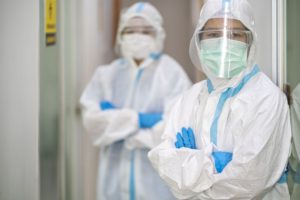 Summary
Summary
Collaboration to meet NHS needs for personal protective equipment (PPE) across AHSNs, with industry, universities and frontline health services has led to improved supply chain resilience, reduced environmental harm and supported economic growth. It is now focusing on sharing best practice across AHSNs.
This approach has had four distinct elements:
- Crisis response – sourcing face shields and masks from local companies
- Crisis management – shared learning eg reprocessing PPE if unable to secure supply
- Innovation – supporting development of new products
- Sustainability – ongoing community of interest across AHSNs sharing best practice around reusable PPE.
“Oxford AHSN has been instrumental in making the connections that got all of this started”
Manufacturer of face shields
Responding to and managing NHS PPE needs
A priority area for health and social care during Covid-19 has been to ensure a consistent supply of suitable personal protective equipment (PPE).
At the start of the pandemic, there was an urgent need for additional sources of PPE to ensure trusts had appropriate levels of protection readily available for staff. This resulted in trusts individually searching for additional suitable suppliers, and inevitably many different organisations engaging with the same suppliers.
There was an identified need to assist health and care organisations to ensure a reliable supply of suitable PPE and to explore options for more reusable PPE.
The Oxford AHSN engaged with all health partners, care organisations and local trusts in the region to understand the level of need for different PPE items and identify gaps. It helped drive the accelerated uptake of new supplies of PPE used by frontline NHS services across the region. This in turn helped trusts ensure a more consistent supply of suitable PPE.
“Thank you for your support in identifying potential suppliers of PPE – this has been really helpful”
Director of Finance at an acute trust
The AHSN achieved this by working with science parks, universities and manufacturers to source additional supplies of PPE. This included working with companies that would not normally manufacture PPE, but wanted to do their bit to help out. One example was the creation of round-the-clock production lines using a number of 3D printers in the Reading area to make face visors at a rate of up to 300 per day. These were distributed to GP surgeries and other frontline NHS services. Read more in this blog.
The practical support offered by the AHSN included:
- supporting new manufacturers to share their manufacturing protocols and sample visors with hospital teams
- contacting multiple suppliers to understand availability of PPE supplies, requesting technical specifications (and samples if necessary) to share with procurement teams
- arranging delivery of PPE samples to one hospital, reviewing and sharing outcomes with all hospitals across the region
- daily update of database of possible suppliers.
Supporting innovation
The Oxford AHSN worked with neighbouring Wessex AHSN to support innovators producing new sustainable PPE products. These included:
- PeRSo hood, a respirator adopted at University Hospital Southampton (UHS) being trialled at NHS trusts in the Oxford AHSN region
- the Oxford box, a reusable aerosol box to reduce risk to staff from aerosol generating procedures adopted at Oxford University Hospitals.
Developing the potential of reusable PPE
To explore the potential of reusable PPE, Wessex and Oxford AHSNs convened a group of relevant NHS leaders and industry experts to share knowledge around alternative sources and scope for reprocessing. Early contributors were UHS and Inivos Ltd, a supplier of space-disinfection equipment.
An initial shared learning webinar for AHSNs and partners around reusable PPE took place at the end of July. A further best practice webinar on the results of reprocessing masks using vaporised hydrogen peroxide by Inivos in collaboration with Addenbrookes Hospital took place in September.
Eight AHSNs are now working together as a ‘community of interest’ with the NHS Sustainability Unit, sharing knowledge on solutions for reusable gowns and masks. As the supply of single-use items becomes more secure, this group will increasingly focus on innovation in fully reusable PPE.
The AHSNs are also linked to the national teams developing new sources of UK supply for reusable gowns and spreading best practice for reusable masks and glove usage. In addition, they will continue to share opportunities to improve the resilience of the PPE supply chain, reduce the environmental impact and support economic growth of UK manufacturers and support services.
Lessons learned
Within a fast paced, evolving situation such as a pandemic, early coordination across organisations is key. This enables a clear understanding of the need, critical gaps in provision and understanding of roles so there is no duplication of effort. Rapid decision-making is possible without compromising business or clinical rigour.

